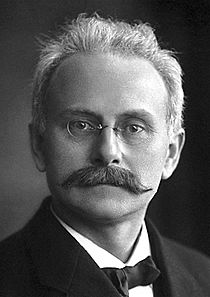Johannes Stark facts for kids
Quick facts for kids
Johannes Stark
|
|
|---|---|

Stark in 1919
|
|
| Born | 15 April 1874 Schickenhof, German Empire
|
| Died | 21 June 1957 (aged 83) |
| Nationality | German |
| Alma mater | University of Munich |
| Known for | Stark effect |
| Awards | Matteucci Medal (1915) Nobel Prize in Physics (1919) |
| Scientific career | |
| Fields | Physics |
| Institutions | University of Göttingen Technische Hochschule, Hannover Technische Hochschule, Aachen University of Greifswald University of Würzburg |
| Doctoral advisor | Eugen von Lommel |
Johannes Stark (15 April 1874 – 21 June 1957) was a German physicist. He won the Nobel Prize in Physics in 1919. He received this award for two important discoveries.
First, he found the Doppler effect in canal rays. This is like how a siren's sound changes pitch as it moves closer or farther away. Second, he discovered the splitting of light lines in electric fields. This effect is now called the Stark effect.
Stark earned his Ph.D. in physics from the University of Munich in 1897. He then worked at several universities. These included the University of Göttingen and RWTH Aachen University. He also taught at the University of Greifswald and the University of Würzburg.
Later in his life, Stark supported Adolf Hitler. He became a leading figure in the Deutsche Physik movement. This group tried to remove Jewish scientists from German physics. After World War II, he was found guilty for his strong support of the Nazi regime.
Contents
Biography
Early life and education
Johannes Stark was born in Schickenhof, which is now part of Freihung, Germany. He went to secondary school in Bayreuth and Regensburg. In 1894, he started college at the University of Munich.
There, he studied many subjects. These included physics, mathematics, chemistry, and crystallography. He finished his studies in 1897. His doctoral paper was about the properties of soot.
Scientific career
After graduating, Stark worked at the Physics Institute of the University of Munich. In 1900, he became a lecturer at the University of Göttingen. He later became a professor at Leibniz University Hannover and RWTH Aachen University.
He continued his research at different universities. In 1919, he received the Nobel Prize in Physics. This was for his work on the Doppler effect in canal rays and the Stark effect. The Stark effect shows how electric fields can split light into different colors.
From 1933 until 1939, Stark led two important German science organizations. He was president of the Physikalisch-Technische Reichsanstalt. He also led the Deutsche Forschungsgemeinschaft.
Stark was the editor of a science journal. In 1907, he asked Albert Einstein to write an article about the principle of relativity. Stark was impressed by Einstein's early work. He even used Einstein's ideas in his own papers. This is interesting because Stark later became a strong opponent of Einstein's theories.
Stark published over 300 scientific papers. Most of his work was about electricity. He received several awards for his discoveries. These included the Nobel Prize and the Matteucci Medal. In 1970, a crater on the Moon was named after him. However, this name was removed in 2020 because of his later actions.
Johannes Stark was married to Luise Uepler. They had five children. He enjoyed growing fruit trees and working in forestry. After World War II, he used his Nobel Prize money to set up a private lab. There, he continued to study how light behaves in electric fields.
Involvement with Nazism
From 1924, Johannes Stark supported Adolf Hitler and the Nazi Party. During the Nazi era, Stark tried to control German physics. He worked with another Nobel Prize winner, Philipp Lenard. They started the Deutsche Physik ("German physics") movement.
This movement was against what they called "Jewish physics." They targeted scientists like Albert Einstein and Werner Heisenberg. Stark even called Heisenberg a "White Jew" in a Nazi newspaper.
In 1934, Stark wrote a book called National Socialism and Science. In this book, he said that scientists should serve the nation first. He believed research should help Germany's military and industry. He also claimed that theoretical physics was "Jewish." He argued that only "pure-blooded Germans" should hold science jobs in Nazi Germany.
After Germany lost World War II, Stark faced a court. In 1947, he was found guilty for his strong support of the Nazi regime. He was sentenced to four years in prison, but this sentence was later suspended.
Later life and death
Johannes Stark spent his final years on his estate in Bavaria. He passed away in 1957 at the age of 83. He was buried in the mountain cemetery in Schönau am Königssee.
See also
 In Spanish: Johannes Stark para niños
In Spanish: Johannes Stark para niños

